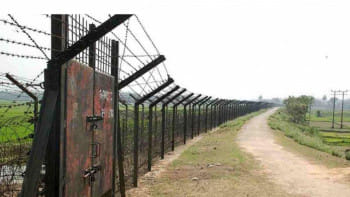Dhaka, Delhi to dig into bilateral treasure
Bangladesh and India yesterday discussed bilateral and regional security issues and problems of cross border terrorism.
The two sides also focussed on opening the entire gamut of multi-modal transportation links between the two countries, including rail, bus service and shipment of cargo by road.
Discussions relating to neighbours, including Bhutan, Nepal and Myanmar were also held.
A joint meeting of experts will be held in Dhaka next week to be followed by a meeting of foreign and home secretaries.
Other subjects of bilateral and regional concern were discussed by the visiting Indian State Minister for External Affairs Ajit Kumar Panja with Bangladesh leaders during calls-on and also at the official level talks between him and his Bangladesh counterpart State Minister for Foreign Affairs Abul Hasan Chowdhury.
The two sides decided to identify all the bilateral problems between the countries and also make maximum use of their physical proximity to improve communications for "best economic advantage." They decided to remove impediments in the way of increasing physical links.
The Indian minister, who arrived on a 3-day trip to Bangladesh, had a hectic programme yesterday, including a call-on with the Prime Minister Sheikh Hasina and the Foreign Minister Abdus Samad Azad.
Ajit Panja, who is a former central minister of Information and belongs to the Trinomool Congress in Vajpayee's coalition government had a one-on-one meeting for nearly 20 minutes with Abul Hasan Chowdhury, before the two sides met for official talks which lasted over an hour.
After the end of the official talks, the two ministers took questions from newsmen.
Ajit Panja said that both sides "reviewed all the bilateral issues that were of concern to our countries and also other neighbouring countries."
He said that discussions were held on security issues concerning the two neigbours and "also about other neighbouring countries."
Panja particularly mentioned that "important discussions" were held about Bhutan, Nepal and Myanmar. He said, without elaborating, that it was important to look regionally since information technology was turning the world in to a global village.
The Indian minister said that the two sides had discussed opening of multi-modal communication system, which would benefit the entire region.
"In the new millennium, the message is to move together and it is the economic content that forms the core issue of bilateral cooperation."
Both the ministers said that a joint statement would be issued at the end of the visit.
The Bangladesh side at the talk, led by Abul Hasan Chowdhury, included Additional Foreign secretary Dr Toufiq Ali, Director General South Asia, Iftekharul Karim and Dhaka's High Commissioner to New Delhi, Mostafa Faruque Muhhamad.
The Indian side, led by Ajit Panja included High Commissioner Dev Mukhkerjee, Deputy High Commissioner Panaki R Das, Economic Counsellor Hamid Rao and Press Counsellor Riva G Das
Abul Hasan Chowdhury told newsmen, "Bangladesh could be considered as a regional 'communications network hub'. We will offer our cooperation after adequate study. The capacity of our roads to carry the burden of cargo has to be examined," he said, while making an indirect reference to India's proposal for transshipment and transit.
He said Dhaka had asked for reducing trade deficits and discussions for sharing the waters of the common rivers, apart from the Ganges.

 For all latest news, follow The Daily Star's Google News channel.
For all latest news, follow The Daily Star's Google News channel. 



Comments